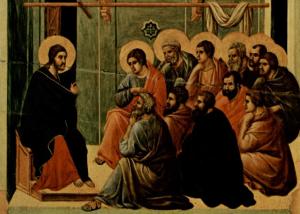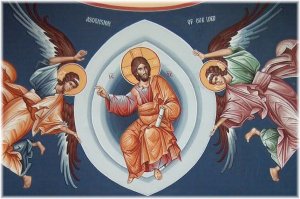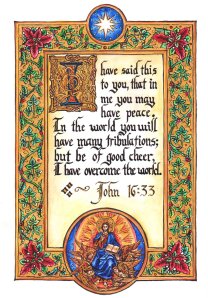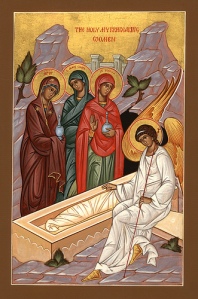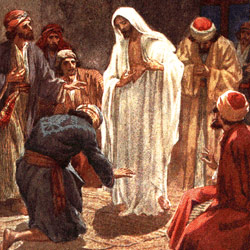[Here is a homily for the Sunday of the Samaritan Woman from ten years ago. I’m glad I saved all these!]
Christ is risen! Today’s gospel (Jn. 4:5-42) is a gospel for the thirsty. If you are not thirsty, if you’re self-satisfied and complacent, and think that everything in your life is just as it should be—especially in your spiritual life—well, you can go home now. The rest of you can stay and listen, because this is a gospel for the thirsty.
Now we meet in this gospel a thirsty woman. She didn’t, perhaps, know how thirsty she really was, or didn’t really know in what her thirst  consisted, although Jesus knew that. So He led her into a little encounter by saying that He was thirsty, to put her at ease, though to start with it didn’t. We can see by her whole dialogue that she was very unhappy. She was a complainer. Kind of like the paralytic from last week, although he was more of a whiner; this woman is a little more arrogant, but she was still an unhappy complainer about her life.
consisted, although Jesus knew that. So He led her into a little encounter by saying that He was thirsty, to put her at ease, though to start with it didn’t. We can see by her whole dialogue that she was very unhappy. She was a complainer. Kind of like the paralytic from last week, although he was more of a whiner; this woman is a little more arrogant, but she was still an unhappy complainer about her life.
Jesus was coming to her to make things better for her, but first He had to help her recognize what her thirst was all about. Perhaps it was a thirst for love, for security, for fulfillment, but she was looking in the wrong places. She tried to satisfy her thirst with men, and she went through quite a few of them. Obviously, that didn’t work, because she was still thirsty, and her life only got more and more unhappy: not only personally, but socially, too, because most likely she was ostracized from the whole community for her behavior. Otherwise, she wouldn’t be going to get water in the heat of the day; she would’ve gone with everybody else in the early morning, when they usually get water. But she was probably a persona non grata with the whole community, so she had to sneak off at a different time, by herself. So she was very unhappy and lonely.
But Jesus, before He could just “fix” everything for her, had to make her realize a couple of things. One of the things was that her unhappiness was her own darn fault. Oftentimes we point the finger at something else for our unhappiness. No matter what happens in life, we find ways to be unhappy. If we don’t get what we want, we’re unhappy. Or if we do get what we don’t want, we’re unhappy. Even if we do get what we do want, we’re still unhappy, because we’re afraid we’re going to lose it, or that it’s not going to last forever, or whatever. We can always manage somehow to be unhappy. But we have to realize, then, that our unhappiness is fundamentally of our own making.
I just read this story recently; it’s more of a parable, I guess, about a man who was a construction worker, and he would come to work every day, just like the o ther guys on the job, and they would all bring their lunch to work. He looks in his lunch bag, and says, “Yuck; peanut butter and jelly again. I hate peanut butter and jelly!” And he would complain like that. And every day, the same thing: “Peanut butter and jelly again! I hate peanut butter and jelly!” So finally, the other guys who were eating lunch with him said, “Well look, if you don’t like peanut butter and jelly, just tell your wife to make you something else!” And he says, “What do you mean, my wife? I’m not married—I make my own sandwiches!”
ther guys on the job, and they would all bring their lunch to work. He looks in his lunch bag, and says, “Yuck; peanut butter and jelly again. I hate peanut butter and jelly!” And he would complain like that. And every day, the same thing: “Peanut butter and jelly again! I hate peanut butter and jelly!” So finally, the other guys who were eating lunch with him said, “Well look, if you don’t like peanut butter and jelly, just tell your wife to make you something else!” And he says, “What do you mean, my wife? I’m not married—I make my own sandwiches!”
This is the problem that we have, and that the Samaritan woman had. She was “making her own sandwiches.” And we “make our own sandwiches”—and then complain about them! Because we don’t like it, and it’s the same old stuff every day. Well, Jesus is trying to tell us that we don’t have to do that! Things can change, with his help, with his presence in our lives.
But we also have to realize that once we know wherein our happiness lies, we do have to make some changes. The Lord didn’t just wave his hands over the Samaritan woman and say, “Now there: everything’s perfect for you!” She had to make some changes in her own life: she had to stop the behavior that she was engaged in, and she also had to change her attitude about life.
It’s time that we start learning from our life experiences, instead of complaining about them. That doesn’t get us anywhere; we just walk around with a “woe is me” attitude all the time. We’re just going to be stuck in the same rut that we’ve dug for ourselves and never get out. We have to recognize first in us the desire for something more than our own “peanut butter and jelly sandwiches”: something that is going to change our life, that can change our life.
Jesus comes and says, “If you only knew what’s possible for you! If you only knew what is the gift of God, and who it is that’s offering this gift to you, offering something that’s not merely going to make you feel good for a little while, like all the other things that you’re searching for in your unhappiness, but something that’s going to be a life-giving spring inside you that never runs dry, that always supplies you with what you really need to be happy!”
But, as often happens when the Lord (or somebody else at the Lord’s bidding) touches a sensitive nerve in our life, we immediately become evasive and change the subject, which is exactly what this woman did. She finally got it, though; that’s when the enlightenment came. She left behind her water jar—symbol of her former life—and ran to the town, telling everyone: “I have found the One! Come and see!” And so she, at that moment, received her enlightenment. Tradition says that she later on became a saint, and they call her St Photina, which means “the enlightened one.”
We have to finally “get it,” too. The Lord is going to be speaking to our hearts, speaking to our thirst, if we’re ready to come to Him and to listen, to recognize the need that we have, and be willing to make the necessary changes in our life that are going to dispose us toward enlightenment.
Enlightenment does not fall out of the sky. Enlightenment is something that comes at the end of a long process of purification, of learning, of struggling, of growing, of opening your heart. It’s been waiting there all the time, but we just can’t receive it—we have too many obstacles inside ourselves to accept it, to experience it and to live in it. So we have to go through this whole process.
First of all, we have to start by recognizing our thirst—that our thirst is for something beyond the cheap little satisfactions that we’re trying to squeeze out of this life. There’s something more than that. We have to recognize where our thirst really is: Jesus spoke of a hunger for the Bread that endures unto eternal life. Our hunger, our thirst and our desire have to be for that which transcends the things that just pass, and we can’t be satisfied with something less than God wants to give us.
We can’t just be self-satisfied, complacent, and unwilling to make that difficult inner journey to discover our thirst, and to see what it is, inside us, that’s gnawing away at us, perhaps, and to realize that there’s something that has to be done, something that has to change, in order to let Christ fulfill that thirst.
We may be like that Samaritan woman, and have all kinds of reasons to complain why our life is not happy—whatever it is: something happened to us in our childhood, or something happened to us yesterday, or whatever—and many things that happen to us do hurt or affect us, and we have no control over them. But we have control over how we’re going to respond to them, what we’re going to do about it. Nothing can force us to be miserable. Nothing can force us to be depressed, to be angry: those are the products of our own thoughts and emotions that we choose to apply in any given situation or event. It’s up to us.
We can choose: we’re free beings, we can decide how we’re going to respond to something, if we learn to live in a way that is not pure reaction—instant, emotional reaction to everything that happens. We can think, we can pray, we can decide how we’re going to react to situations, and we don’t have to be miserable all the time, making peanut butter sandwiches and then complaining about them. There is something that we can do for our life so that we don’t have to just carry this “cross” of our own making and be grumbling and resentful at life because it didn’t give us a better treatment. We have no excuse for complaints. This is the message that Jesus is giving to us.
Then, once we recognize our thirst, and the place we have to go to slake it, then we have to look at our other attitudes that have to be healed. Then, when we find a healing of our attitudes, and we realize that the presence of the Spirit in us empowers us to make the necessary changes in our life, to recognize our true thirst and to fulfill it, we’ll realize that we need much less than we think we need to be happy. And the happiness that we do find in God, will be a lasting, rich, rewarding, true happiness—and that will really satisfy our thirst.
Then we will come to that deeper enlightenment about what’s really true in the gospel, and our relationship with God comes alive for us, personally. Then, we can tell others what we have found. But we have to be what we’re preaching, first. That’s a real hard thing; preachers are always afraid to preach, because we know we don’t practice what we preach, but we have to, and we have to at least try to embody the message, or else we will not be credible.
There’s a story about Gandhi, that this woman came to Gandhi with her son and said, “My son is eating sugar, and it’s not good for him! Tell him not to eat sugar!” And Gandhi said to her, “Come back in two weeks.” She said, “OK.” And so, two weeks later, she comes back, with her son, and Gandhi says to him, “Don’t eat sugar.” And she said, “That’s all? Why did it take you two weeks, just so you could say, ‘Don’t eat sugar’?” And he said, “Because, two weeks ago, I was eating sugar.”
You have to embody what you preach. You have to be doing it yourself before you can tell somebody else to do it. That’s why we have to go through the process of personal purification, conversion, enlightenment—and then we can say, I can show you the way now. I can point to you the way, the truth, and the life.
If we only knew the gift and who it is that offers it, and what He can do for us, how he can heal and enlighten and fulfill us, we would open our hearts wide to receive that gift, we would leave behind the leaky water jar of our attachments, narrow-minded attitudes, and all that closes us off from true life and joy. Then we would begin to worship in spirit and in truth, and walk the path of the enlightened followers of our Lord Jesus Christ.
 In our monastery we have two periods of Eucharistic Adoration in common each day, which we do in addition to Lauds and Vespers. We also have daily private vigils, in which one is free to engage in this divine exercise still more. I am originally from the Byzantine tradition, wherein Eucharistic Adoration, Exposition, and Benediction are not practiced, for reasons I needn’t explain at this time. So for many years I did not experience the benefit of it, nor was there any reason or opportunity to integrate it into my own spiritual life and practice. But now it is not only possible but required in common and strongly encouraged in private. And lately—since I have committed myself to daily Eucharistic vigils not long ago—I have been reaping the fruit of it. I have received many insights into Scripture and the working of the Holy Spirit in my own soul and life, and how the Lord is leading me into a more profound spiritual life, fruitful prayer and ministry. Just remaining in the radiance of the Uncreated Light invisibly flowing from the Eucharistic Heart of Jesus in the Blessed Sacrament is enough to open my heart to receive whatever He wishes to communicate or grant to me.
In our monastery we have two periods of Eucharistic Adoration in common each day, which we do in addition to Lauds and Vespers. We also have daily private vigils, in which one is free to engage in this divine exercise still more. I am originally from the Byzantine tradition, wherein Eucharistic Adoration, Exposition, and Benediction are not practiced, for reasons I needn’t explain at this time. So for many years I did not experience the benefit of it, nor was there any reason or opportunity to integrate it into my own spiritual life and practice. But now it is not only possible but required in common and strongly encouraged in private. And lately—since I have committed myself to daily Eucharistic vigils not long ago—I have been reaping the fruit of it. I have received many insights into Scripture and the working of the Holy Spirit in my own soul and life, and how the Lord is leading me into a more profound spiritual life, fruitful prayer and ministry. Just remaining in the radiance of the Uncreated Light invisibly flowing from the Eucharistic Heart of Jesus in the Blessed Sacrament is enough to open my heart to receive whatever He wishes to communicate or grant to me. 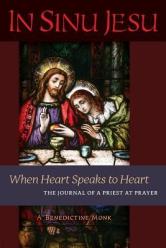 astery and their life, go to https://www.cenacleosb.org/) It is a book of locutions from Jesus, who spoke to Fr Kirby through the Blessed Sacrament, encouraging the practice of Eucharistic Adoration and calling him to a special vocation of adoration and of reparation, especially for priests, so that the Catholic priesthood might be renewed and transformed—precisely through the rediscovery and fervent, frequent practice of adoring Our Lord in the Most Holy Sacrament of the Altar.
astery and their life, go to https://www.cenacleosb.org/) It is a book of locutions from Jesus, who spoke to Fr Kirby through the Blessed Sacrament, encouraging the practice of Eucharistic Adoration and calling him to a special vocation of adoration and of reparation, especially for priests, so that the Catholic priesthood might be renewed and transformed—precisely through the rediscovery and fervent, frequent practice of adoring Our Lord in the Most Holy Sacrament of the Altar.

